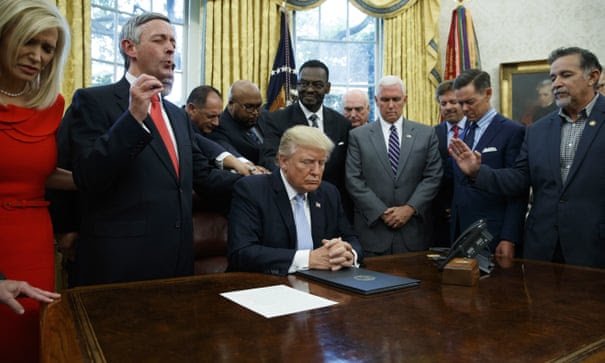
White House officials are reportedly drafting plans to make US foreign aid conditional on how countries treat their religious minorities, in an effort that is seen as a sop to Christian evangelicals in Donald Trump’s base.
The move, which threatens to impose further constraints on a US foreign aid policy already heavily restricted under the Trump administration, was first reported by Politico following briefings from White House aides.
The aides suggested the US Commission on International Religious Freedom listings could be used for identifying which countries should have their aid withheld.
According to the report, the proposal could also be extended to include US military assistance with a potential impact on countries from Iraq to Vietnam and India. The commission’s “Tier 1” designated countries – regarded as the most serious offenders – include US partners such as Saudi Arabia as well as adversaries like Iran.
Critics point out that a number of key regional partners of the US, including Iraq and India, have been accused of restricting religious minority rights leading to the suspicion that any new restrictions are likely to be used selectively.
Two White House officials told Politico that the idea was in its infancy while an executive order was being drafted, adding that imposing sanctions was being considered as a method of achieving the same aims.
The move follows commitments by Trump on religious freedom. During his UN general assembly speech in September, Trump signalled that his administration would continue prioritising the issue.
“Hard to believe, but 80% of the world’s population lives in countries where religious liberty is in significant danger or even completely outlawed,” Trump said. “Americans will never tire in our effort to defend and promote freedom of worship and religion.”
“Oh man, there’s so many ways that could go wrong,” Jeremy Konyndyk, a former senior aid official in the Obama administration, told Politico.
He said that, depending on how strictly the administration interprets the idea of “religious freedom,” it is likely to hit national security concerns about protecting certain allies. Egypt and India, for example, arguably have religious freedom issues, he noted, but both receive US aid.
Since Trump’s election, his administration has long sought to cut some US foreign aid programmes either for political reasons – like the US defunding of its donations to UNRWA, the main agency for Palestinian refugees – or because it argues that agencies are wasteful or inefficient.
Trump has also suggested at times that foreign aid should be contingent on countries backing US interests.
The White House backed away from its latest effort to cut billions of dollars in foreign aid in the summer, after an outcry in Congress over what was seen as an attempt to sidestep lawmakers’ authority over government spending.
The latest moves follow reports by Propublica that the office of the vice-president, Mike Pence, had put pressure on the US Agency for International Development to direct its Middle East funding to preferred Christian groups in Iraq, citing internal emails and interviews with dozens of current and former US officials and aid professionals.
*story by The Guardian